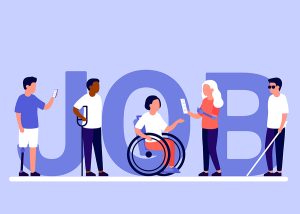 The government’s Department for Work and Pensions (DWP) has released new disability employment data today, showing disability employment rates are rising.
The government’s Department for Work and Pensions (DWP) has released new disability employment data today, showing disability employment rates are rising.
However, Epilepsy Action says it is “disappointed” that this rise has not impacted employment in people with epilepsy, which remains among the lowest at 33.3%.
The numbers show a slower rise in the number of people classed as disabled compared to previous years. However, the unemployment gap between disabled and non-disabled people has remained where it has been for years, at around 30 percentage points.
The statistics also highlight that disability employment is lower for disabled people with a mental health condition. Depression affects around a third of people with epilepsy, and studies suggest a third of people with epilepsy also have anxiety.
Disabled people were more likely to be “underemployed”, “in low pay” and in jobs with “fewer career opportunities”, the data showed. In addition, previous data suggest that people with epilepsy have the second largest pay gap of any disability, being paid 26.9% less than non-disabled people doing the same jobs.
The government statistics also found that disabled economically inactive people were more likely to want a job than non-disabled economically inactive people.
Resilient and practical
 Tom Shillito, health improvement and research manager at Epilepsy Action, said the figures highlight the hundreds of thousands of talented people who want to work but need better support from the government.
Tom Shillito, health improvement and research manager at Epilepsy Action, said the figures highlight the hundreds of thousands of talented people who want to work but need better support from the government.
He said: “It is deeply disappointing to see that the latest government statistics show little real progress. The figures remain broadly in line with what we already know – that only around 33% of people with epilepsy are in work which is the second lowest employment rate of any disabled group.
“We know that the disability employment gap is too big, and the gap for people with epilepsy is even bigger. People with epilepsy continue to face some of the greatest barriers to employment of any disabled group – with rates among the lowest, alongside those with autism and learning disabilities.
“People with epilepsy also face the second largest pay gap of any disability, with people with epilepsy being paid 26.9% less than their colleagues.
“Behind those figures are hundreds of thousands of talented people who want to work but are still being held back by stigma, fear and a lack of understanding about epilepsy in the workplace.
“People with epilepsy are often more resilient and practical or have a different, more creative way of looking at things because of the challenges they face having the condition. These can be really good skills to have in the workplace and we know people with epilepsy have so much talent to contribute to our economy and society.”
Valued for their skills
Tom says disabled people need targeted support from the government and employers, as well as a reform of Access to Work and mandatory disability pay reporting.
“We know that when employers have the right awareness and make simple adjustments people with epilepsy can and do thrive. That’s why Epilepsy Action is rolling out dedicated training for both employers and people with epilepsy to build understanding and confidence around epilepsy at work because we know that knowledge makes a real difference.
“Epilepsy Action will keep campaigning for a world without limits, where everyone with epilepsy has the chance to succeed, contribute and be valued for their skills.”
Last year, the government announced plans to get more people into work alongside a big reform to the welfare system with the aim of saving 5 billion by 2029/30.
Epilepsy Action strongly opposed changes to personal independence payments (PIP) in the welfare bill, saying that cutting this essential benefit is not the way to get more disabled people into work.
Epilepsy Action also has information for employers on supporting staff with epilepsy, and information for people with epilepsy to find and stay in work.
More articles







